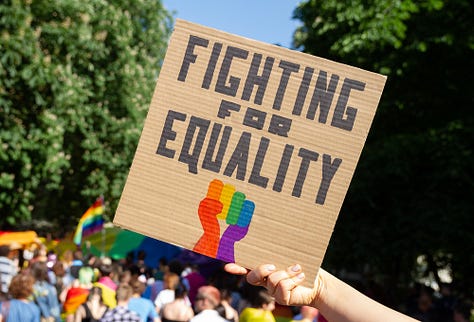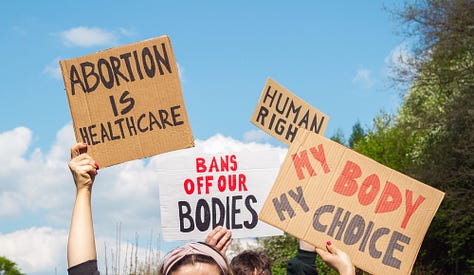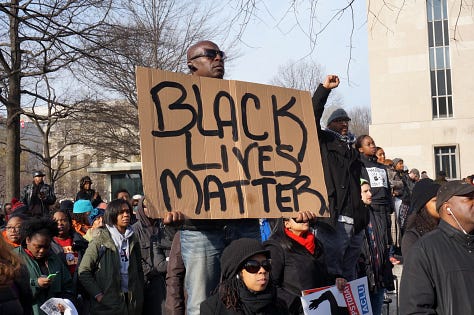The Democrats' Interest Group Problem Explained
We get letters ... and I respond! Also, did Trump underperform? A Trump f**k up watch update and a top-notch Musical Interlude
I’m Michael A. Cohen, and this is Truth and Consequences: A no-holds-barred look at the absurdities, hypocrisies, and surreality. If you were sent this email or are a free subscriber and would like to become a paid subscriber, you can sign up here.
If money is tight or you’re already up to eyeballs in subscriptions, here’s another idea — share this article. Email it to a friend (or even an enemy). Post it on Facebook, Twitter, or LinkedIn. Text or email it to your wife, husband, mother, father, brother, sister, or even your creepy second cousin who lives in Brussels. Word of mouth is often the best way to build support for a creative endeavor, so if everyone here sends it to just one person … it would be much appreciated.
The Democrats’ Interest Group Problem



I received an interesting comment from a reader after yesterday’s post.
Instead of looking at the Democratic Party and seeing a bunch of constituent parts all of which must be catered to...just try to appeal to as many people as possible. Have an ethos, and go after as many Americans as needed. Simple, easy, and kill identity politics (like trying to pick up Jewish, Latino, Asian, etc voters) because it's clear that catering to people based on their racial identity is not the key to unlocking their votes.
On the surface, this makes a lot of sense. Surely, broad-based appeals are better than narrow constituent-focused ones.
But the problem is that the Democratic Party is composed of “a bunch of constituent parts,” and any Democratic politician who wants to go far needs to appease them. It's easy to say, "Appeal to as many people as possible." But in practice, it's exceptionally hard (though it’s worth noting that Democrats have a better track record than Republicans in appealing to as many people as possible. They've won the popular vote in 7 of the last nine presidential elections). The other part of the challenge for Democrats is that deep-pocketed Democratic donors tend to be more liberal and more focused on identity politics than the party as a whole. In short, Democrats are consistently being dragged to the left, both by donors and their constituent parts.
To be clear, Republicans have the same interest group issues. They also must appease far-right Republican constituencies, and it’s why there are so many extreme Republican Senate and House candidates — and it’s also why so many of these extreme Republican Senate and House candidates lose.
Their appeal is limited to the far right and doesn’t translate as well to a non-GOP electorate. One could easily argue that the reason Republicans don’t have larger majorities in the House and Senate (and why they fared so poorly in 2022) is because they nominated so many terrible candidates in the last several election cycles. Indeed, going back to the Tea Party in 2009-10, Republicans have left so many winnable Senate seats on the board because GOP voters nominated terrible candidates. The irony of Jentleson’s argument that Democratic constituency groups are a problem for the party is that recent elections have shown they are an even bigger problem for Republicans.
Indeed, one reason Democrats have done better in recent Senate and Hosue elections is that their members usually don't face liberal primary challenges, and they can nominate more moderate, middle-of-the-road candidates with broader political appeal. That’s how you get strong candidates like Elissa Slotkin in Michigan and Ruben Gallego in Arizona. In 2022, Democrats had candidates like John Fetterman and Mark Kelly, while Republicans were stuck with Dr. Oz and Blake Masters (it’s worth noting that Oz beat Dave McCormick in the GOP primary and two years later McCormick topped Bob Casey to win election to the Senate).
Democrats face a far greater challenge when running for president. Liberal activists hold much greater sway in presidential primaries (as do the aforementioned deep-pocketed donors), so pacifying this group is essential. That’s how you got Kamala Harris filling out an ACLU questionnaire and saying she’d support gender surgeries for trans prisoners.
A Democratic presidential nominee has to win over Black voters. They must conduct outreach to the LGBTQ community. Generally speaking, they need to take a hard line on abortion, support gun control measures, and oppose draconian immigration measures because, ultimately, those positions matter in a Democratic primary. Does this undermine their chances of becoming president? It didn’t really damage Barack Obama or Joe Biden — and arguably is not the reason why Hillary Clinton lost in 2016. Did it fatally undermine Kamala Harris? While it likely didn’t help, it’s hard to say it’s the reason she fell short.
Moreover, Harris ran a campaign that was very short on identity politics. She rarely talked about the fact that she would have been the first female president (and even less about the fact that she would have been the second Black president). Most of her campaign messages were focused on the economy and abortion, which I suppose is a constituent group issue, but a lot less so after the Dobbs decision overturning Roe v. Wade. Indeed, she even tried to win over Republican voters by appearing with former Republican officials like Liz Cheney and Adam Kinzinger. Ultimately, it wasn’t enough, but at least give Harris credit for trying to come up with a broad-base political message in a truncated presidential campaign.
The simple reality is that both parties must cater to their liberal constituent groups while crafting a message that appeals to a broader swathe of voters. Newly-elected Arizona Senator Ruben Gallego makes this point well in the New York Times today.
Mr. Gallego has long warned against relying solely on identity politics to win over Latinos. In 2020, he admonished Democrats for using “Latinx,” a gender-neutral term pushed by liberal policymakers but derided by many Latinos, in part because it is difficult to say in Spanish.
He said that he, himself, had successfully employed identity politics in his campaign, with a focus on his background and that he was set to become Arizona’s first Latino senator. But he also consistently hammered his desire to help families by lowering costs.
“You could use identity politics to connect, but you’ve got to deliver an economic message at the end,” Mr. Gallego said. “Right now, there’s these two warring camps, and they’re both wrong. You’re going to have to do both.”
A lot of Democrats have figured this out! Joe Biden did in 2020. Barack Obama did in 2008. Kamala Harris did it in 2024, just not well enough to win the White House. A host of Senate and House Democrats have also successfully done it. Indeed, Democrats have been balancing the competing demands of interest groups for decades (like, for example, when Democrats needed to win the votes of Black voters and Southern segregationists). This is the essence of American coalition politics. Nothing in this election has changed the need to develop, hone, and perfect the balancing of these competing demands — and there is no reason to believe that a future Democratic presidential candidate won’t be able to do it.
Did Trump Underperform?
I was so shocked by the numbers below that I had to double-check to make sure they were correct (they are).
Keep reading with a 7-day free trial
Subscribe to Truth and Consequences to keep reading this post and get 7 days of free access to the full post archives.



